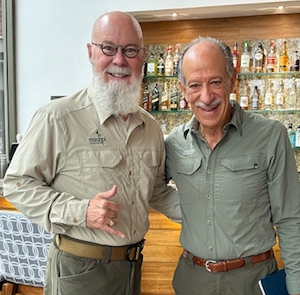Impressed with the urgency of doing
June 13, 2024The Life’s work of Roque Sevilla
By Thomas S. Mullikin, PhD
Today’s environmental issues often seem so large and complex that the average person does not feel that they can make a difference; while others may simply not be inclined to try. People are witnessing extreme weather that has manifested in more intense storms including hurricanes, more wildfires, desertification, and sea-level rise causing coastal erosion. They are searching for good information and logical paths forward.
[Pictured L-R Dr. Tom Mullikin and Roque Sevilla]
The great Leonardo da Vinci once said: “I have been impressed with the urgency of doing. Knowing is not enough; we must apply. Being willing is not enough; we must do.” These words ring truer today than any other time in my life. Our ecological issues are pressing and complicated. The good news is that each of us can make a difference.
One man who has dedicated his life to making a difference is Roque Sevilla in Ecuador.
I recently spent a few days with Roque at his ecolodge and laboratory in the Masphi Cloud Forest [https://www.mashpilodge.com/] where I delivered two lectures to scientists and ecotourists. Roque is a former Director and Board Member of the World Wide Fund for Nature International (WWF) who previously served as a member of the National Congress of Ecuador and the mayor of Quito. He is also the Founder of the Mashpi Cloud Forest Lodge.
Roque’s efforts with this lodge alone are jaw dropping – conservation and careful ecotourism that has provided jobs to more than 120 locals in the economically disadvantaged area. The Cloud Forest of Masphi is a spectacular and diverse biome with 96 species of mammals, 410 species of birds, 25 species of fish and much, much more.
The rare and beautiful cloud forests flank the eastern and western slopes of Ecuador’s Andes. Ecuador’s cloud forests are not only filled with exotic plants such orchids, ferns and bromeliads but are also home to waterfalls and crystalline rivers, colorful butterflies and some of the best and easiest bird watching in the world – tropical birds such as glistening green tanagers, toucans and several species of hummingbird.
The difference between a cloud forest and a rain forest is elevation. Cloud forests are found on higher ground, typically between 1,800 meters to 3,500 meters (5,906–11,483 feet). The staggered topography of cloud forest on the slopes of the Andes also allows more sunlight to penetrate through the foliage – allowing the astonishing range of plant life and wildlife to thrive.
Water retention is a critical function of the Cloud Forest. The vegetation acts like an active sponge regulating the flow of water. More than 60 percent of the water in the atmosphere is captured in the cloud forest. Without this capacity there would be massive tree mortality at lower elevations resulting in severe erosion, landslides and floods in periods of abundant rainfall which could cause major ecological and human disasters.
Cloud Forests are also an important carbon sink. Considering the slow decay of organic matter in these high-elevation forests, it is estimated that their dead biomass matches that of the living forests. Andean forests rank as one of the densest carbon deposits among all tropical ecosystems.
Roque and his team have built an extraordinary team of scientists, naturalists and staff that would rival the finest five-star resort all while minimizing the impact on the local environs through energy generation with hydroelectric power from the rivers and creeks, waste segregation and composting and use of ambient light to offset energy consumption. It is a case study for ecological efficiency and a model demonstrating that protecting and conserving the Lord’s Garden can be economically and environmentally sustainable.
Roque is a recognized global leader in conservation and ecological protection. His body of work will stand the test of time and has demonstrated what one person who understands the urgency of doing can in fact do. Theodore Roosevelt said: “Great thoughts speak only to the thoughtful mind, but great actions speak to all mankind.” Roque’s actions have crossed state and international boundaries and stands and have spoken to all mankind.
As you reflect on Roque’s work, I hope you will remember the words of the great Chief Seattle: “We don’t inherit the earth, we borrow it from our children.” Let us move forward with purpose to protect and conserve this beautiful Earth that we borrow briefly from our children.
Dr. Tom Mullikin is a global expedition leader, attorney, university professor, former U.S. Army officer, and retired two-star commander of the S.C. State Guard. He serves as chair of the gubernatorially established S.C. Floodwater Commission and he is the leader of the annual SC7 Expedition from the mountains of South Carolina to the sea. Dr. Mullikin is currently on an exploratory mission in Ecuador where he penned this piece during his trek from Mount Chimborazo in the Andes to the famed Galapagos Islands.





















